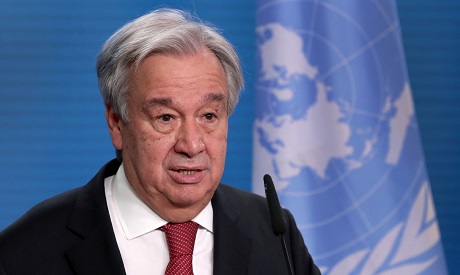
In this file photo UN Secretary-General Antonio Guterres attends a joint press conference with the German Foreign Minister after a meeting in Berlin, on December 17, 2020 AFP
UN Secretary-General Antonio Guterres "remains deeply concerned" that "foreign elements" continue to operate in Libya, he wrote in a report to the Security Council.
The document, obtained by AFP and discussed Wednesday by Council members, notes some mercenaries have withdrawn, but considers the amount insufficient.
It indicates that foreign forces left the center and west of the coastal city of Sirte on February 28 to Wadi Harawa, about 50 kilometers (30 miles) east, to help secure the city and allow the reopening of the Al-Ghardabiya airport.
But "there has reportedly been no reduction of foreign forces or their activities in central Libya," Guterres said in his report.
Oil-rich Libya descended into chaos after dictator Muammar Gaddafi was toppled and killed in a 2011 NATO-backed uprising, resulting in multiple forces vying for power.
The UN had estimated in December that 20,000 foreign troops and mercenaries were active in Libya.
"I reiterate my call on all national, regional and international actors to respect the provisions of the ceasefire agreement in order to ensure its full implementation without delay. This includes complete and unconditional respect for and compliance with the United Nations arms embargo," Guterres wrote.
Several previous UN reports -- one of which called the arms embargo "totally ineffective" -- have highlighted the presence in Libya of Russian, Chadian, Sudanese and Syrian mercenaries, among others, as well as Turkish military units.
"Their withdrawal from Libya will go a long way in reconstituting the unity and sovereignty of the country and healing the deep wounds caused by many years of internal strife, active conflict and foreign interference," its new envoy for Libya, Jan Kubis, told the Security Council.
- 'A stab in our back' -
In his report Guterres details his proposal for a gradual deployment of a ceasefire observation mission and the departure of mercenaries and foreign troops.
However, he does not specify the number of observers, who will be unarmed civilians in agreement with the Libyan parties.
The observers must include women and young people, Kubis stated.
Initially the observers, integrated into the UN Mission in Libya (UNSMIL), will focus on the coastal road, then extend their activities to a triangle between Abu Grein, Bin Jawad and Sawknah before a possible third stage extended to other locations.
"The reopening of the coastal road remains a critical step for the steady and sustainable, if gradual implementation of the Ceasefire Agreement" reached in October, noted Kubis.
He welcomed the fact that "significant progress has been made on clearing the coastal road connecting Misrata with eastern Libya from explosive remnants of war."
At its last meeting in Sirte on March 15, the joint military commission with representatives from the east and west agreed to open the road within 15 days, the envoy said.
Several countries, such as the United Kingdom, Mexico, Kenya, Niger and France, also called for mercenaries to leave, including those from the Russian private security company Wagner, which is reputed to be close to Moscow.
The foreign forces should have left no later than three months after the conclusion of an October 23 ceasefire agreement, but it is now "more than 150 days later," said French Ambassador Nicolas de Riviere.
Earlier this month Libya's then prime minister-designate Abdul Hamid Dbeibah, speaking in Sirte, called the mercenaries "a stab in our back" and said they must leave.
According to diplomats, a Security Council resolution being prepared by the UK is expected to specify the mandate of the monitoring mechanism and give a green light for its formal activation.
Short link: